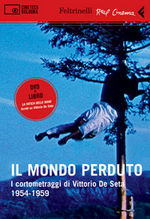Il mondo perduto

In 1954 Vittorio De Seta shot six documentaries in Sicily (Lu tempu di li pisci spata, Isole di fuoco, Surfarara, Pasqua in Sicilia, Contadini del mare, Parabola d’oro). They were highly innovative and quickly received international recognition. Isole di fuoco won best documentary prize at Cannes Film Festival in 1955. The following year Contadini del mare was victorious at the Mannheim Festival.
In 1958-59 he directed four more important short films: in Sicily (Pescherecci), in Sardinia (Pastori di Orgosolo; Un giorno in Barbagia), and in Calabria (I dimenticati).
Martin Scorsese, presenting his films as part of an homage at the Tribeca Film Festival, defined De Seta as “an anthropologist who expresses himself with the voice of a poet”, and in effect, after watching the films gathered together on this DVD, one has to agree with him. Whether it's the epic struggle of the miners against the veins of sulphur in Surfarara, the natural elegance and dignity of the shepherds in Pastori di Orgosolo, or the ferocious and archaic dance of the 'tonnaroti' (fishermen) in Contadini del mare, De Seta always turns his sympathetic eye to realities threatened by “a development without progress”, giving us a precious eyewitness account of rites, customs and knowledge that have almost disappeared. He does this without neglecting the beauty of his framing, the most recent innovative techniques, or the incumbent heritage of the most important cinema from the last half century.
1954/1959 The short films of Vittorio De Seta brings together De Seta's work from ’54 to ’59, short films - restored by the L'Immagine Ritrovata laboratory of Cineteca di Bologna - which can be ranked alongside Ejzenstein and Flaherty's work, and up there amongst the monuments of Italian cinema.
Extras
De Seta tells us about himself in a long exclusive interview with the director.
The book
Opening with a previously unpublished piece by Roberto Saviano, the book contains an introduction by Martin Scorsese, as well as essays on De Seta and his work by Alberto Farassino, Goffredo Fofi, M.Gazzano and Vincenzo Consolo.











